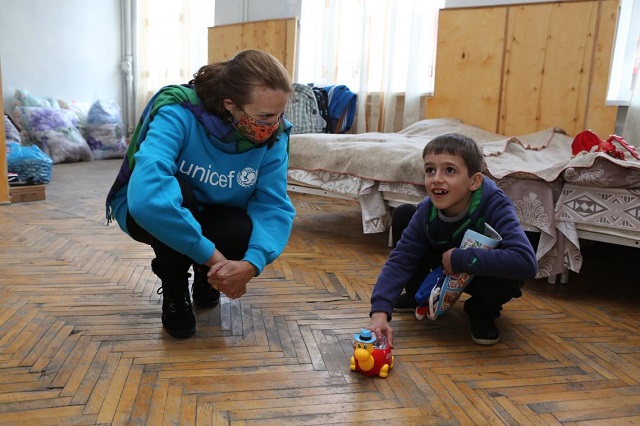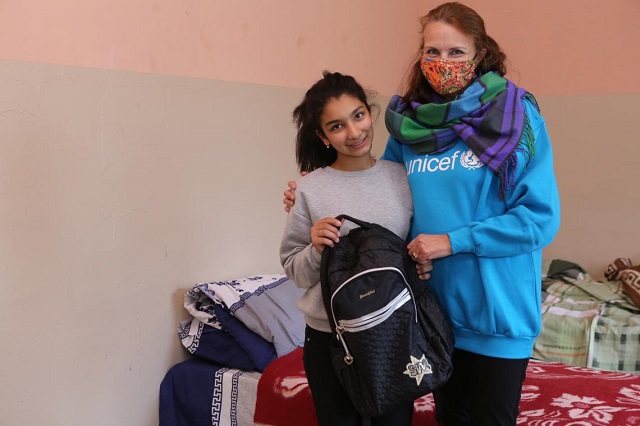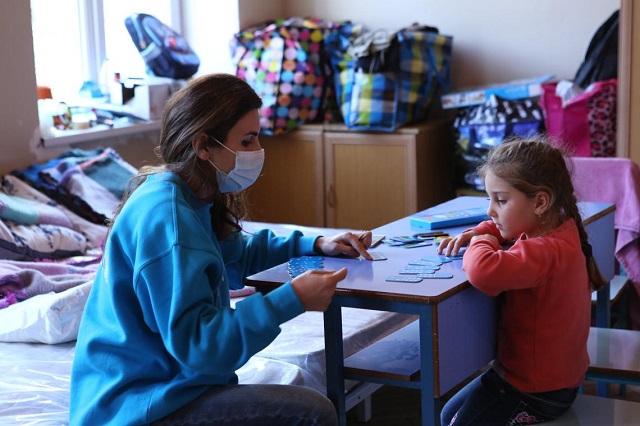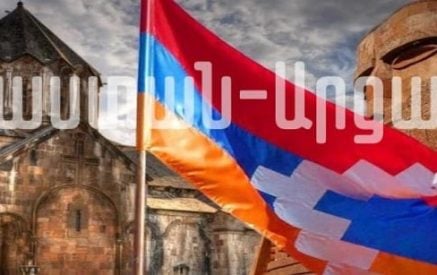UNICEF supports children affected by the conflict in Nagorno-Karabakh to continue their education in Armenia
We met Sergey, 8, in Dilijan. He is from Stepanakert, or as he puts it, “Hi! I’m Sergey from Artsakh!” Before 27 September, when the conflict escalated in Nagorno-Karabakh, Sergey was in the third grade at a public school in Stepanakert. For the past month though, Sergey has not been able to continue his education, as he had to move, first, to Yerevan and then to Dilijan with his mother and two siblings, as a result of the conflict.
“We took a bus to Yerevan. We didn’t manage to take a lot with us, only some clothing. I had to leave my books and notebooks behind, as we thought we would return back soon,” he says.
Sergey loves his Armenian language class at school and misses his teacher, Ms. Petrosyan, a lot. He shared that he enjoys reading, particularly fairy tales, which is why he was very upset to leave all his books behind.
“We heard a lot of explosions and that our school was hit. But I am not afraid to go back, I want to go back to Ms. Petrosyan’s class so that we can read many more fairy tales,” said Sergey. He likes the color blue, so he chose his own blue backpack with school supplies provided by UNICEF. Sergey also happily informed us that schools have reopened in Dilijan after an extended fall break, and that on 16 November, he will finally go to school again with his new notebooks, pens and pencils.
Read also

UNICEF Armenia/2020/Galstyan – Sergey showed a toy to UNICEF Armenia Representative Mrs. Marianne Clark-Hattingh.
Victoria, 12, is also staying in Dilijan with her mum and her brother. In September, she started seventh grade in Stepanakert. “I saw a photo of my school online and it was completely damaged. I was so upset to see my school in that condition. I met all my friends there, and it was such a beautiful school,” shared Victoria.
Victoria is confident that her school will be reconstructed in the future, and that she will be able to go back there with her classmates. “I talk every day to my friends, who are now in Yerevan. We share our sadness together, we make jokes together and, in this way, we empower each other to overcome this situation. We give hope to each other. And together, we continue to hope that one day we will all go back to our city and go to our school again.”
When Victoria’s family left Stepanakert on 30 September, she only managed to grab some outfits and her mobile phone. “I left my backpack and all my books there. As far as I can tell, our apartment is untouched, so my stuff should be alright. But I will definitely take UNICEF’s backpack with me. I love stationery, and I get very excited for school when I organize my school supplies!”
Victoria told us about her love for her mum and her dad, and her school. She dreams of a world where there are no wars and where children do not have to flee from their homes. “I want that no child ever sees their school damaged or anyone to feel what I felt,” she said.
Our trip would not be complete without five-year-old Lia, who is staying in Dilijan with her mum, sister, and grandmother from Khachmach village in Askeran. Lia told us that while Khachmach did not have a kindergarten, she knows her numbers well. “Mummy taught me!” she said with pride.
Lia’s mother told us how they had to leave the village on 30 September as it was getting dangerous to stay. Children had a hard time sleeping at night because of all the noise and would get scared and start crying with every loud sound of explosion. Together with her mother in law, Lia’s mum gathered some belongings, collected the children and took the overnight bus to Yerevan, leaving behind all they owned. Now that the fighting has stopped, they are waiting to see whether the village is safe to return to.
Although a girl of few words, Lia has already written her letter to Santa Claus with the help of her mummy. “I know that everything will be alright, so I asked Santa Claus that we go back to our house soon and that daddy is with us again.”
2020 has been a difficult year for children all over the world, particularly in Armenia. On this World Children’s Day and every day, UNICEF is working to reach children with the support that they need. By investing in children’s needs, we also invest in peace, in social cohesion and in lasting development in Armenia. Let us unite behind these needs and give Sergey, Victoria and Lia, and all the children of the world the better future they deserve.
UNICEF is working in Armenia to support children, affected by the conflict in Nagorno Karabakh so that they can continue their education and receive psychosocial support. We have provided backpacks with schools supplies and COVID-19 personal protective material to 3,000 children, and 100 tablets to community schools to support distance learning. UNICEF is also working to establish 11 early learning corners and 15 learning spaces in temporary shelters.




























































